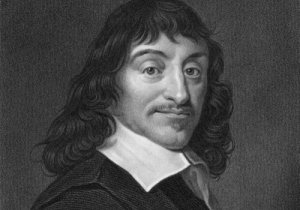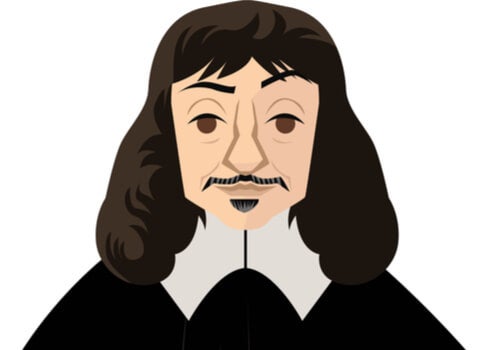René Descartes: The Father of Modern Philosophy

Not only is René Descartes the father of modern philosophy, but he’s also the most influential rationalist. Just like most other geniuses, he was interested in many different things. For that reason, he ventured into different areas such as mathematics, geometry, morals, philosophy, and even art. He was courageous enough to confront the scholastic philosophy which, in fact, was still prevalent in its time and full of prejudices.
As of right now, people still debate about the authenticity of his approaches. According to some authors, there’s an extreme coincidence between the work of René Descartes and that of Gómez Pereira, a 16th-century Spanish humanist. Likewise, the theses about his method are incredibly similar to those of Francisco Sánchez, whom people called the “Skeptic”.
People considered these coincidences as well as others in relation to the work of Agustín de Hipona and Avicena. Because of this, they accused him of plagiarism. The debate continues to this day and there’s enough evidence to tell that a part of Descartes’ work is too similar to that of his predecessors. However, the French philosopher also made contributions that many consider authentic.

The first years of René Descartes
René Descartes was born in Touraine, France, on May 31, 1596. His father was an advisor in the Parliament of Brittany and his mother died shortly after he turned one. Since then, both his grandmother and a nurse took care of him. He always maintained a close bond with the two of them.
From a very young age, he asked questions about everything. For this reason, his father began to call him “little philosopher”. His health during his childhood years was very fragile. When he was 11 years old, he began studying at a Jesuit college and stood out as a very deep student. Math and physics were incredibly easy for him.
At age 18, he began studying medicine and law at the University of Poitiers. When he was 22 years old, he moved to the Netherlands, a country which he loved dearly until the day he died. René Descartes was a tireless traveler – something he discovered about himself with that first great displacement.
“It isn’t enough to have a good mind; the main thing is to use it well.”
-René Descartes-
A magnificent researcher and creator
Between 1618 and 1648, René Descartes had his most fertile intellectual stage as a researcher and creator. On several occasions, he mentioned that he had premonitory or revealing dreams quite often. In fact, he interpreted those messages as messages from heaven. Moreover, he assumed that they prepared him to be the author of an important intellectual piece of work. On one occasion, he felt able to establish the basis of analytical geometry thanks to these dreams. And on another, Euler’s theorem approach to polyhedrons.
Sooner rather than later, he became a reference for the intellectuals of the time. His house in France became a meeting point for scientists and philosophers. There isn’t a lot of information about his personal life. On one hand, some affirm that he grieved for a woman in 1628. On the other hand, though, there are some allusions to his alleged homosexuality.
The climax of his work came with the publication of Discourse on the Method, in 1637. He called it a discourse instead of a treaty because he feared to make the Scholastics angry and end up just like Copernicus and Galileo did. That fear also led him to live in the Netherlands, which was a more open and tolerant country than France.

The death of René Descartes
The death of René Descartes has also been a subject of great controversy. Officially, he died of pneumonia that he contracted in Stockholm, after being invited by Queen Cristina of Sweden to her palace. This was historically assumed, until, in the year 1980, German specialist Eike Pies raised a new hypothesis. According to him, Descartes was killed with arsenic.
Later, Theodor Ebert, another specialist in the subject, ratified the same hypothesis. According to his research, Descartes was perceived as less than a heretic. The church and the Scholastics were suspicious of his rationalist approaches. They couldn’t grasp why he’d give reason such a fundamental role in the human structure. Apparently, that’s why Queen Cristina’s confessor gave him a sacred host poisoned with arsenic.
René Descartes marked a before and after in the history of Western philosophy and thought. His contributions were decisive in the inductive method, as well as in mathematics and physics. His most famous phrase, “I think, therefore I am”, marked a new way of seeing the human being and reality. With this great philosopher began a new chapter for humanity.
“The greatest minds are capable of the greatest vices as well as of the greatest virtues.”
-René Descartes-
Not only is René Descartes the father of modern philosophy, but he’s also the most influential rationalist. Just like most other geniuses, he was interested in many different things. For that reason, he ventured into different areas such as mathematics, geometry, morals, philosophy, and even art. He was courageous enough to confront the scholastic philosophy which, in fact, was still prevalent in its time and full of prejudices.
As of right now, people still debate about the authenticity of his approaches. According to some authors, there’s an extreme coincidence between the work of René Descartes and that of Gómez Pereira, a 16th-century Spanish humanist. Likewise, the theses about his method are incredibly similar to those of Francisco Sánchez, whom people called the “Skeptic”.
People considered these coincidences as well as others in relation to the work of Agustín de Hipona and Avicena. Because of this, they accused him of plagiarism. The debate continues to this day and there’s enough evidence to tell that a part of Descartes’ work is too similar to that of his predecessors. However, the French philosopher also made contributions that many consider authentic.

The first years of René Descartes
René Descartes was born in Touraine, France, on May 31, 1596. His father was an advisor in the Parliament of Brittany and his mother died shortly after he turned one. Since then, both his grandmother and a nurse took care of him. He always maintained a close bond with the two of them.
From a very young age, he asked questions about everything. For this reason, his father began to call him “little philosopher”. His health during his childhood years was very fragile. When he was 11 years old, he began studying at a Jesuit college and stood out as a very deep student. Math and physics were incredibly easy for him.
At age 18, he began studying medicine and law at the University of Poitiers. When he was 22 years old, he moved to the Netherlands, a country which he loved dearly until the day he died. René Descartes was a tireless traveler – something he discovered about himself with that first great displacement.
“It isn’t enough to have a good mind; the main thing is to use it well.”
-René Descartes-
A magnificent researcher and creator
Between 1618 and 1648, René Descartes had his most fertile intellectual stage as a researcher and creator. On several occasions, he mentioned that he had premonitory or revealing dreams quite often. In fact, he interpreted those messages as messages from heaven. Moreover, he assumed that they prepared him to be the author of an important intellectual piece of work. On one occasion, he felt able to establish the basis of analytical geometry thanks to these dreams. And on another, Euler’s theorem approach to polyhedrons.
Sooner rather than later, he became a reference for the intellectuals of the time. His house in France became a meeting point for scientists and philosophers. There isn’t a lot of information about his personal life. On one hand, some affirm that he grieved for a woman in 1628. On the other hand, though, there are some allusions to his alleged homosexuality.
The climax of his work came with the publication of Discourse on the Method, in 1637. He called it a discourse instead of a treaty because he feared to make the Scholastics angry and end up just like Copernicus and Galileo did. That fear also led him to live in the Netherlands, which was a more open and tolerant country than France.

The death of René Descartes
The death of René Descartes has also been a subject of great controversy. Officially, he died of pneumonia that he contracted in Stockholm, after being invited by Queen Cristina of Sweden to her palace. This was historically assumed, until, in the year 1980, German specialist Eike Pies raised a new hypothesis. According to him, Descartes was killed with arsenic.
Later, Theodor Ebert, another specialist in the subject, ratified the same hypothesis. According to his research, Descartes was perceived as less than a heretic. The church and the Scholastics were suspicious of his rationalist approaches. They couldn’t grasp why he’d give reason such a fundamental role in the human structure. Apparently, that’s why Queen Cristina’s confessor gave him a sacred host poisoned with arsenic.
René Descartes marked a before and after in the history of Western philosophy and thought. His contributions were decisive in the inductive method, as well as in mathematics and physics. His most famous phrase, “I think, therefore I am”, marked a new way of seeing the human being and reality. With this great philosopher began a new chapter for humanity.
“The greatest minds are capable of the greatest vices as well as of the greatest virtues.”
-René Descartes-
All cited sources were thoroughly reviewed by our team to ensure their quality, reliability, currency, and validity. The bibliography of this article was considered reliable and of academic or scientific accuracy.
- Descartes, R. (2004). Discurso del método. Ediciones Colihue SRL.
- Descartes, R. (2005). Las pasiones del alma (Vol. 290). Edaf.
- Descartes, R., & Leibniz, G. W. (1925). Los principios de la filosofía. Reus.
- Meyer, O. E. (1999). Breve biografía de René Descartes (1596-1659). Frónesis, 6(2).
This text is provided for informational purposes only and does not replace consultation with a professional. If in doubt, consult your specialist.







